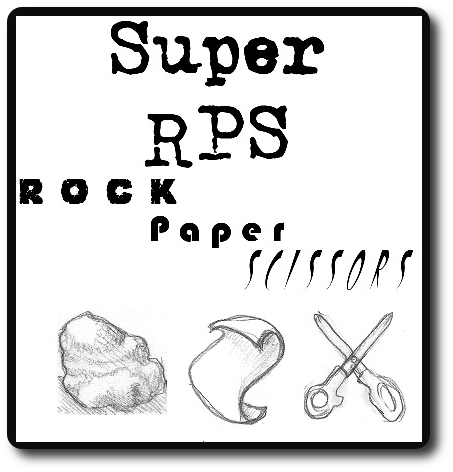
The Basics:
- For ages 8 and up (publisher suggests 10+)
- For 2 to 6 player
- Variable game length
Geek Skills:
- Active Listening & Communication
- Counting & Math
- Logical & Critical Decision Making
- Reading
- Hand/Resource Management
Learning Curve:
- Child – Easy
- Adult – Easy
Theme & Narrative:
- The classic hand game of Rock Paper Scissors on steroids…
Endorsements:
- Gamer Geek mixed!
- Parent Geek approved!
- Child Geek mixed!
Overview
Odds are you have determined the outcome of some life decision by engaging your adversary in the ancient and traditional battle of Rock Paper Scissors. Maybe it was to determine who would be the first player in a game, decide who should pay the restaurant bill, or even get to name the new puppy. In this game, Rock Paper Scissors is taken to new heights of intensity and competitiveness. Clever timing divides the winner from the loser. Puppy not included.
Super RPS: Rock • Paper • Scissors (referred to as Super RPS for the duration of this review), designed by Fred Poure and published by Cloven Fruit Games, is comprised of 110 cards. The cards are printed on durable card stock and are standard playing card size. The artwork is minimalistic in its approach and each card uses a mix of text and icons to represent the card’s actions.
Game Set Up
To set up the game, first find and remove all the Soldier and Advanced Rule cards from the rest of the deck. Soldier cards represent “Rock”, “Paper”, and “Scissors” in the game. Set the Advanced Rule cards aside unless they are being used (see “Game Variants” below).
Second, pass to each player a complete set of Soldier cards. As you have already guessed, a complete set of Soldier cards is 1 “Rock” Soldier card, 1 “Paper” Soldier card, and 1 “Scissors” Soldier card. Any Soldier cards not given to a player are set aside and out for the duration of the game.
Third, the players now select 1 of their Soldier cards and place it face-down in front of them, The remaining 2 Soldier cards are placed to the player’s right and kept face-down, too. The card in front is the player’s starting form.
Fourth, shuffle the deck of cards and deal out to each player a total of 6 cards. Players should make certain they keep their hand of cards hidden from their opponents at all times. Place the remaining cards in the center of the playing area, face-down. This is now the draw deck. Leave room next to the draw deck for a discard pile.
Fifth, all the players now pair off and complete a quick challenge of Rock Paper Scissors using the traditional schoolyard rules most of us have grown up with. The winner of each pairing goes on to face the winner of the last pairing and so on until there is only one overall winner. This individual is the first player for the duration of the game.
Sixth, each player now reveals their selected Soldier card, keeping it in front of them, and the game begins.
Card Types
Super RPS is comprised of 7 different card types. We’ll summarize them here.
Soldiers
Soldier cards represent the standard “Rock”, “Paper”, and “Scissors” and play two important roles in the game. The first is the player’s current form which defines the basic rules of engagement for attacking and defending. For example, a “Rock” can attack “Scissors”, but cannot attack another “Rock” or “Paper”. The second is the player’s “lives”. Each player starts with 3. When they lose a battle, they lose their currently active Soldier card. Lose all 3 and they are out of the game.
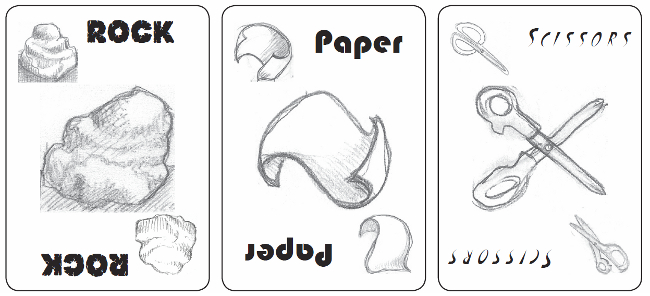
Combat
Combat cards are the only means to attack and defend. They will either allow for an attack, defend against an attack, both, multiply the total combat strength (defined by increasing and decreasing simple number values), multiplying the combat strength, and dividing the combat strength. All Combat cards are black and contain an illustration of a sword (attack), a shield (defense), or both.
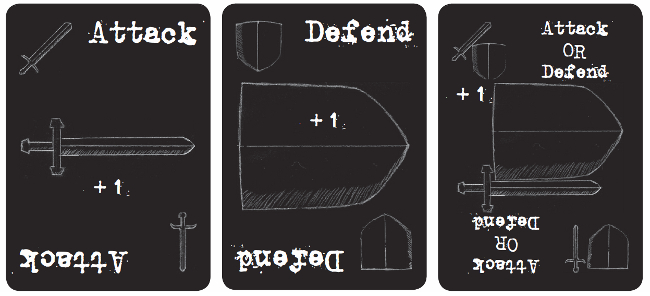
Alter Reality
Alter Reality cards shift the standard combat rules of engagement by changing which Soldier forms can attack another. Traditionally, “Rock” can attack “Scissors”, “Scissors” can attack “Paper”, and “Paper” can attack “Rock”. The Alter Reality cards can change the natural order of things. Ever see “Rock” on “Rock” violence? It isn’t pretty. Alter Reality cards can be discarded on the same turn as they are played, in a later turn by the player who owns it, or removed by an opponent later in the game using cards that cancel it. Only one Alter Reality card can ever be in played at a time.
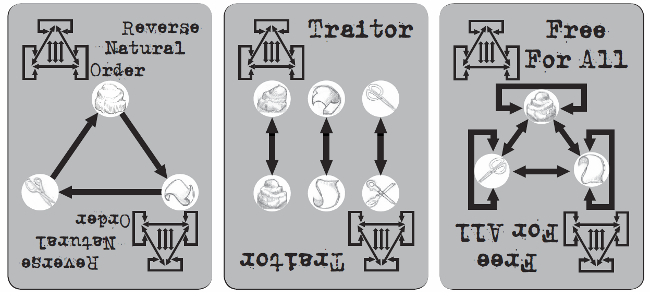
Advanced Rules
The Advanced Rule cards describe a single change to the standard game play. Players are welcome to select none, 1, 2, or all of the Advanced Rules if they want. This is done during game set up and the Advanced Rule cards selected are active throughout the entire game. When in use, the Advanced Rule card is placed face-up next to the draw deck for all the players to see. For the most part, each rule described will add time to the game play and bit more complexity.
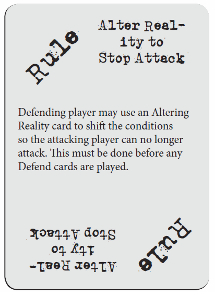
That’s Enough of That!
That’s Enough of That! cards cancel Alter Reality and Morphing cards, stops an opponent from playing cards on the player, and can even cancel the last card played, regardless of what it was. When played, the That’s Enough of That! card and the card it cancels are both sent to the discard pile.
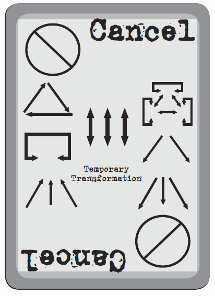
Trade Hands
Trade Hands cards force a trade of card hands with the opponent to the player’s left or right, by Soldier form, or give the player the choice with whom they would like to trade with. Trade Hands can only be blocked by the opponent if they have a That’s Enough of That! card available that cancels the trade. A player can, if they time it right, take all the cards from an opponent and give them nothing in return!
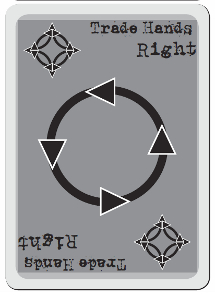
Morphing
Morphing cards temporarily change a Soldier card into a different form. A “Rock” can temporarily become “Paper”, for example. The benefits of such a change should be immediately obvious. By morphing into another form, the player can avoid combat or engage in combat with an opponent who they normally could not. Morphing cards can be discarded on the same turn as they are played, in a later turn by the player who owns it, or removed by an opponent later in the game using cards that cancel it. Only one Morphing card can be played on a Soldier card at a time.
Game Play
Super RPS is played in turns with no set number of turns in a game. On a player’s turn, they will complete a few very simple steps. We have summarized a typical player’s turn here.
Step 1: Draw Cards
The first thing a player will always do is draw cards until they have a total of 6 in their hand. If there are ever not enough cards in the draw pile, simply shuffle the discard pile to create a new draw pile.
Step 2: Play Cards or Don’t
The next step allows the player to play as many cards as they like and in any order they choose. They are also welcome to not play any cards at all, either by choice or because the current Soldier cards in play do not allow for any combat.
- Play Alter Reality cards
- Play Morphing cards
- Play That’s Enough of That! cards
- Play Trade Hands cards
- Play Combat cards
The use of Alter Reality, Morphing, That’s Enough of That!, and Trade Hands is fairly straight forward and summarized in the “Card Types” section above. What deserves a bit more explanation is combat. When a player initiates combat with another player, they must first follow the rules of engagement that state which Soldiers can attack other Soldiers. For example, a “Paper” Soldier card could not attack another “Paper” Soldier or a “Scissors” Soldier normally. Of course, by playing Alter Reality and Morphing cards, the player can change who they can attack and who they can be attacked by.
When the rules of engagement state the player can attack their target, they must play 1 “Attack” Combat card to the table. The defender must then play 1 “Defend” Combat card or they immediately forfeit and lose the attack. Each player now has a combat pile of cards they will continue to play to until one or both players can no longer or chose not to play any additional Combat cards. The player with the most combat points (indicated by the number values on the Combat cards) in their combat pile will win. All the cards played are sent to the discard pile.
If the attacker wins, the defender loses their Soldier card (removing it for the duration of the game) and then selects any Soldier card they have remaining to now play with. If the defender wins, nothing happens to the attacker or the defender. If total combat points in the attacker’s and the defender’s combat piles are the same, it’s a tie, and the winner is then determined by playing a standard game of Rock Paper Scissors using the hands.
Note that a player is never required to play Combat cards if they don’t want to. This allows the player to force a tie if they think they can gain an advantage by doing so.
Step 3: Draw Cards
The last thing a player will always do is draw cards until they have a total of 6 in their hand. If there are ever not enough cards in the draw pile, simply shuffle the discard pile to create a new draw pile. Note that any player who plays cards out of turn does not get to draw more cards until their next turn.
This completes the player’s turn. It’s now the next player’s turn going clockwise.
Winning the Game
The game continues until only one player remains who still has at least 1 Soldier card available. The last player standing wins!
Game Variants
There are a number of game variants included with Super RPS that can be used. We have summarized them here.
- Basic Game: The game described above represents the “standard” game. It includes all the cards except the Advanced Rule cards (which are always optional). The “basic” game removes a number of the more complicated cards that will confuse new players. The removed cards can later be introduced one at a time or added back to the game in full once new players have a solid grasp of the game play.
- Advanced Rules: The Advanced Rule cards change 1 game rule per card. Players should all agree on which Advanced Rule cards they want to use before adding them to their game.
To learn more about Super RPS: Rock • Paper • Scissors, visit the game’s web page.
Prediction
While I don’t think the game itself is supposed to be overly difficult, the rule book is not the easiest of documents to navigate. The majority of the content is organized in table boxes that are sometimes stacked like a single column and sometimes slightly disjointed. The end result is a rule book that doesn’t allow the reader to get a good grasp of the game play quickly. Which, again, I think is completely contradictory to the game itself. Super RPS was not designed to be a difficult game. I’d put it in the same circle of difficulty as Fluxx or Munchkin. This is meant to be a light and casual game, despite the rules feeling like a tremendous amount of work. I invite you to review the rule book and share my pain.
Once I got through the rules, I was able to piece together how the game was meant to be played. The rule book provides several examples of game play by taking the reader through several game turns. While descriptive, it’s nothing more than a play-by-play breakdown. It’s almost completely useless, however, until the player understands how the cards combo, block, stack, and cancel each other.
Where am I going with this? Simply put, I spent more time than I think was required just getting myself comfortable enough to predict each of our groups’ endorsement levels. That being said, I believe Super RPS will do somewhat well with the Child Geeks, very well with the Parent Geeks (who have shown me time and time again they love Fluxx and Munchkin), and just might be tactical and interesting enough to get the Gamer Geek vote. After all, they did give their thumbs-up to Cthulhu Fluxx and it’s not at all uncommon to see Gamer Geeks ending an evening or killing time kicking down doors in a game of Munchkins. Heck, the Gamer Geeks currently can’t get enough of Smash Up, and I consider that one very light game, indeed.
Teaching Super RPS is actually pretty simple, but only after you know how to play it. Do your players and yourself a favor by learning how to play the game before you attempt to teach it. Like I said, the rule book is not very helpful and a lot of the game only makes sense after you play a hand or two. But it all very quickly falls into place. None of our players had any questions when we were done teaching it and everyone was ready to go. But before I played the game for the first time with my oldest little geek, I asked him his thoughts on Super RPS so far.
“It’s Rock Paper Scissors on steroids, Dad!” ~ Liam (age 8)
Indeed it is! Let’s play the game and see if we all have a surprisingly good time or we all feel like we’ve been crushed, covered, and cut by its soldiers.
Final Word
The Child Geeks were mixed when it came to their level of endorsement for Super RPS. There were times when some of the Child Geeks felt picked on or overly targeted. They very well might have been, but this is an aggressive game by design. But it’s also light and meant to be played fast. Every hand is a potential loss of a Soldier card and every player can only lose 3 times before they are out. This “3 strikes and your out” condition was not lost on the Child Geeks and some of them really stressed about it. But overall, they really seemed to enjoy themselves. How they responded when we asked them their level of endorsement was completely based on how well they thought they did during the game. More importantly, how much they felt picked on. For those Child Geeks who played consecutively well (primarily the older Child Geeks), the game scored very high. For those Child Geeks who sometimes won or never won (primarily the younger Child Geeks), the game did poorly.
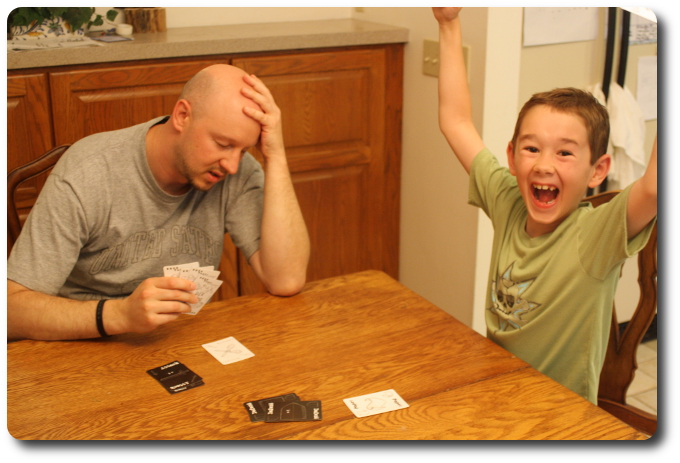
My oldest manages to squeak out a win after an intense last battle – I was proud of him…eventually
The Parent Geeks really enjoyed Super RPS. They were laughing, grunting (which is always silly when you hear it in a card game), cheering, booing, and swearing under their breath from start to finish. According to one Parent Geek, “This is a great little card game that keeps me on my toes and eager to play more!” At which point, they clapped their hands excitedly. Another Parent Geek stated, “This is a simple game using simple rules, but I always felt like I was being challenged to play my best.” All the Parent Geeks enjoyed their time with Super RPS with their peers (even the non-gamers had a good time). Depending on the age of their Child Geeks, the game did very well at the family gaming table, too. The Parent Geeks fully endorsed Super RPS and continue to ask for it.
The Gamer Geeks were also mixed when it came to their endorsement for Super RPS. I purposely sought out players who enjoyed games like Fluxx and Munchkin to get their take on the game. I also sought out players who hated these games. What I was attempting to determine was the game’s overall level of fun with different Gamer Geek groups. My efforts did not disappoint. For those Gamer Geeks who enjoyed games like Fluxx and Munchkin, Super RPS pleased them and they found the game to be “a good filler or a late night game that would be perfect to end an evening of more complicated games.” For those Gamer Geeks who did not, they found Super RPS to be “a simple exercise of just ducking and dodging.”
Personally, I find Super RPS to be very entertaining with the right group. The game play is simple, but the number of choices a player can make on their turn can be a lot of fun to play and to observe. For example, I had one player morph from “Paper” to “Rock” so they could attack their “Scissors” opponent who had just completed a rather lengthy bout of combat as the defender. This almost exhausted the “Scissors” player’s cards, leaving them vulnerable. Normally, they would be safe from “Paper”, but they didn’t take into account that one player would quickly change their form so as to complete a deadly attack. It was little things like the surprise card plays, the tilting, and the shifting within the game, that made it really appealing to me. I wouldn’t ever go so far as to say that Super RPS has a great deal of strategy or tactics, but a very capable player who understands the subtle timing necessary to maximize their cards and recognizes opportunity when it’s offered is going to have a blast with Super RPS.
I think Super RPS is a descent game for casual game players, for quick game fillers, mixed skill groups, or just anytime you want a card game where thinking is necessary, but burning your brain cells is not. Lots of close calls in this game and some painful defeats. And for the adults, lots of swearing and vendettas. If you are looking for a unique card game that amps up and improves the traditional hand game of Rock Paper Scissors, look no further than Super RPS: Rock • Paper • Scissors!
This game was given to Father Geek as a review copy. Father Geek was not paid, bribed, wined, dined, or threatened in vain hopes of influencing this review. Such is the statuesque and legendary integrity of Father Geek.

